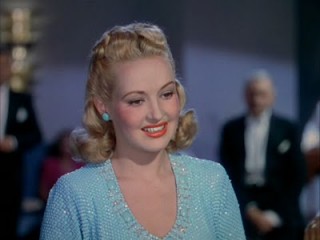
Betty Grable biography
Date of birth : 1916-12-18
Date of death : 1973-07-02
Birthplace : South St. Louis, Missouri
Nationality : American
Category : Famous Figures
Last modified : 2010-12-17
Credited as : Actress in musical and comedy, films: I Wake Up Screaming, When My Baby Smiles at Me , The Dolly Sisters
4 votes so far
Grable played supporting parts in two-reelers and bits in features for the next couple of years, attaining her first major role in Hold 'Em Jail (1932), a comedy starring the comedy team of Wheeler and Woolsey. Bert Wheeler had promised Grable's mother several years earlier that he'd get the girl a break in pictures if she came to Hollywood, and with this film, Wheeler kept his word. More bits and indifferent supporting roles followed until Grable was signed by Paramount, who loaned her to 20th Century-Fox for Pigskin Parade (1936), which established her with the public. Grable finally landed top billing in Paramount's Million Dollar Legs (1939)--the title referred not to the star but to a college athletic team--which co-starred her first husband, Jackie Coogan. Grable's career stalled at Paramount, but a Broadway appearance in the Cole Porter musical DuBarry Was a Lady led to a contract with 20th Century-Fox, where she remained a number-one box-office attraction from 1940 through 1955. Fox wisely allowed Grable to shed her "college co-ed" image for a more salable screen persona as a wholesomely sexy musical comedy star, emphasizing her greatest attributes: her shapely figure and shapelier legs. After a misfire attempt at heavy dramatics in I Wake Up Screaming (1941), Grable insisted that she be required only to sing and dance, not act, and Fox complied with a string of nonsensical but lavish Technicolor musicals.
Grable was enormously popular with American GIs during the war, most of this popularity resting on her famous "pin-up" picture in which, dressed in a one-piece bathing suit and with her back to the camera, Grable glanced saucily over one shoulder. This rear-view image was borne not out of a desire to titillate but from necessity: she was several months pregnant when the picture was taken! Grable furthered her acceptance with the overseas troops when she married trumpeter-bandleader Harry James in 1943. Her popularity undimmed by war's end, Grable continued making Technicolor frolics, though her frequent tiffs with the Fox executives led the studio to try out any number of potential replacements, including Vivian Blaine, June Haver, and even Marilyn Monroe. A few miscalculated breakaways from her accepted screen image--Mother Wore Tights (1947), The Beautiful Blonde From Bashful Bend (1949) and The Shocking Miss Pilgrim (1949)--hurt Grable's box-office status, even though these films hold up better than some of her wartime hits. Free-lancing after her last film, the lackluster How to Be Very, Very Popular (1955), Grable inadvertently offended producer Sam Goldwyn, thereby losing out on the chance of playing the plum role of Adelaide in Goldwyn's Guys and Dolls (1955); this and a few disappointing TV appearances prompted the actress into semi-retirement, save for a few nightclub appearances. After divorcing Harry James in 1965, Grable made a triumphal return to Broadway as Carol Channing's replacement in Hello, Dolly. Her later foray into musical comedy, Belle Starr, was less satisfying, closing its London run after two weeks. Shortly before her death, Grable appeared in advertisements for a number of low-calorie food products, her alluring figure and beautiful "gams" belying her age.
















